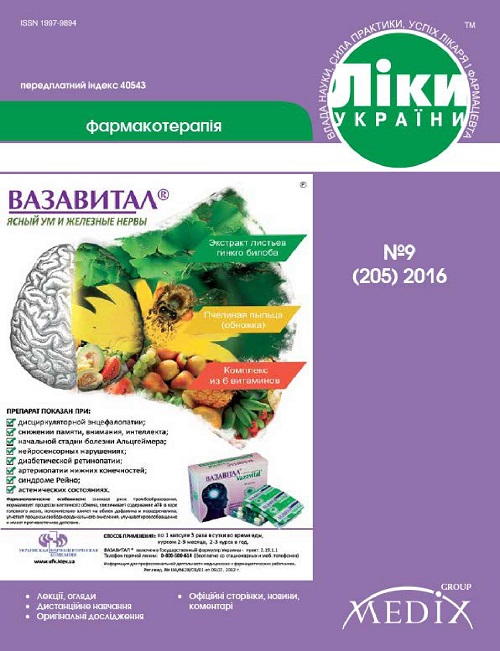Хвороба Крона: місце лабораторних методів дослідження
DOI:
https://doi.org/10.37987/1997-9894.2016.9(205).207240Ключові слова:
хвороба Крона, лабораторні аналізи, запальні захворювання кишечникаАнотація
Раніше лабораторні аналізи займали скромне місце при хворобі Крона. В епоху біопрепаратів лабораторні аналізи стали невід’ємною складовою оцінки запального навантаження при захворюванні (С-реактивний білок, кальпротектин у випорожненнях), оскільки оцінка стану на основі симптомів суб’єктивна, не дозволяє прогнозувати відповідь на фармакологічне втручання, ризик рецидиву, а також диференціювати хворобу Крона з виразковим колітом. Необхідно розробити набір лабораторних інструментів, які дозволять відбирати кандидатів для лікування препаратами, що пригнічують фактор некрозу пухлин, оцінювати ризик побічних явищ і виробити індивідуалізований підхід до лікування і його корекції. Фармакогенетичні інструменти допоможуть розширити наше розуміння молекулярних механізмів, що лежать в основі відмінностей у реакції на лікування при хворобі Крона.
Посилання
Cappello M., Morreale G.C. The Role of Laboratory Tests in Crohn’s Disease // Clin. Med. Insights Gastroenterol. – 2016. – Vol. 9. – P. 51–62.
Niederau C., Backmerhoff F., Schumacher B. et al. Inflammatory mediators and acute phase proteins in patients with Crohn’s disease and ulcerative colitis // Hepatogastroenterology. – 1997. – Vol. 44. – P. 90–107.
Tibble J., Teahon K., Thjodleifsson B. et al. A simple method for assessing intestinal inflammation in Crohn’s disease // Gut. – 2000. – Vol. 47. – P. 506–513.
Stange E.F., Travis S.P., Vermeire S. et al. European Crohn’s and Colitis Organisation European evidence based consensus on the diagnosis and management of Crohn’s disease: definitions and diagnosis // Gut. – 2006.– Vol. 55 (Suppl. 1).– i1–i15.
Zholudev A., Zurakowski D., Young W., Leichtner A., Bousvaros A. Serologic testing with ANCA, ASCA anti-OmpC in children and young adults with Crohn’s disease and ulcerative colitis: diagnostic value and correlation with disease phenotype // Am. J. Gastroenterol. – 2004. – Vol. 99 (11). – P. 2235–2241.
Kallel L., Ayadi I., Matri S. et al. Fecal calprotectin is a predictive marker of relapse in Crohn’s disease involving the colon: a prospective study // Eur. J. Gastroenterol. Hepatol. – 2010. – Vol. 22 (3). – P. 340–345.
Sidhu R., Wilson P., Wright A. et al. Faecal lactoferrin – a novel test to differentiate between the irritable and inflamed bowel // Aliment. Pharmacol. Ther. – 2010. – Vol. 31 (12). – P. 1365–1370.
Siemons L., Ten Klooster P.M., Vonkeman H.E., van Riel P.L. et al. How age and sex affect the erythrocyte sedimentation rate and c-reactive protein in early rheumatoid arthritis // BMC Musculoskelet Disord. – 2014.– Vol. 15.– P. 368.
Wander K., Brindle E., O’Connor K.A. C-reactive protein across the menstrual cycle // Am. J. Phys. Anthropol. – 2008. – Vol. 136. – P. 138–146.
Wunder D.M., Yared M., Bersinger N.A., Widmer D. et al. Serum leptin and c-reactive protein levels in the physiological spontaneous menstrual cycle in reproductive age women // Eur. J. Endocrinol. – 2006. – Vol. 155.– P. 137–142.
Tsilidis K.K., Branchini C., Guallar E., Helzlsouer K.J. et al. C-reactive protein and colorectal cancer risk: a systematic review of prospective studies // Int. J. Cancer. – 2008. – Vol. 123. – P. 1133–1140.
Kathiresan S., Larson M.G., Vasan R.S. et al. Contribution of clinical correlates and 13 C-reactive protein gene polymorphisms to interindividual variability in serum c-reactive protein level // Circulation. – 2006. – Vol. 113. – P. 1415–1423.
Henriksen M., Jahnsen J., Lygren I. et al. C-reactive protein: a predictive factor and marker of inflammation in inflammatory bowel disease. Results from a prospective population-based study // Gut. – 2008.– Vol. 57.– P. 1518–1523.
Kiss L.S., Papp M., Lovasz B.D. et al. High-sensitivity c-reactive protein for identifi cation of disease phenotype, active disease, and clinical relapses in Crohn’s disease: a marker for patient classification // Inflamm. Bowel Dis. – 2012.– Vol. 18. – P. 1647–1654.
Solem C.A., Loftus E.V. Jr, Tremaine W.J., Harmsen W.S. et al. Correlation of c-reactive protein with clinical, endoscopic, histologic, and radiographic activity in inflammatory bowel disease // Inflamm. Bowel Dis. – 2005.– Vol. 11.– P. 707–712.
Poullis A.P., Zar S., Sundaram K.K. et al. A new, highly sensitive assay for C-reactive protein can aid the differentiation of inflammatory bowel disorders from constipation- and diarrhoea-predominant functional bowel disorders // Eur. J. Gastroenterol. Hepatol. – 2002. – Vol. 14.– P. 409–412.


